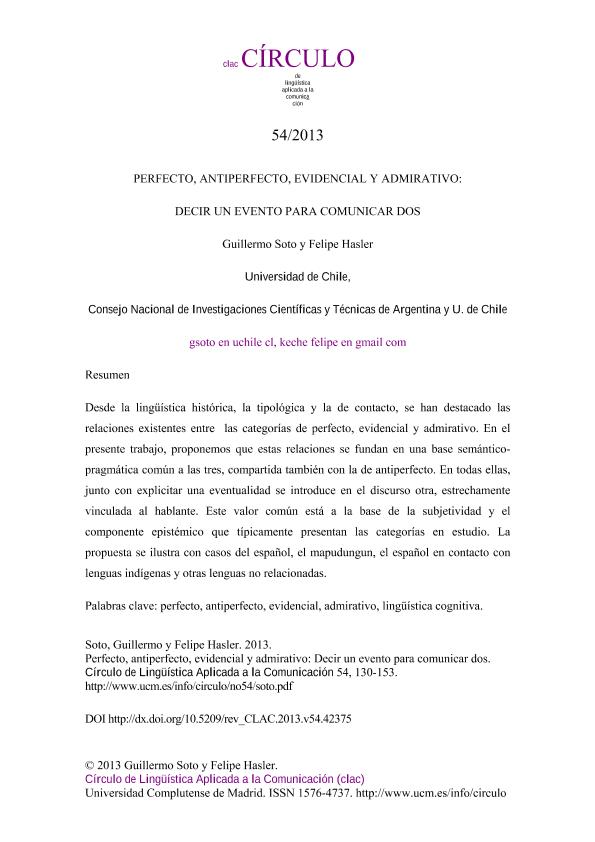Mostrar el registro sencillo del ítem
dc.contributor.author
Soto, Guillermo Daniel

dc.contributor.author
Hasler Sandoval, Felipe Daniel

dc.date.available
2019-09-05T20:39:01Z
dc.date.issued
2013-05
dc.identifier.citation
Soto, Guillermo Daniel; Hasler Sandoval, Felipe Daniel; Perfecto, Antiperfecto, Evidencial y Admirativo: Decir un evento para comunicar dos; Universidad Complutense de Madrid; Circulo de Lingüística Aplicada a la Comunicacion; 54; 5-2013; 130-153
dc.identifier.issn
1576-4737
dc.identifier.uri
http://hdl.handle.net/11336/83010
dc.description.abstract
Desde la lingüística histórica, la tipológica y la de contacto, se han destacado las relaciones existentes entre las categorías de perfecto, evidencial y admirativo. En el presente trabajo, proponemos que estas relaciones se fundan en una base semánticopragmática común a las tres, compartida también con la de antiperfecto. En todas ellas, junto con explicitar una eventualidad se introduce en el discurso otra, estrechamente vinculada al hablante. Este valor común está a la base de la subjetividad y el componente epistémico que típicamente presentan las categorías en estudio. La propuesta se ilustra con casos del español, el mapudungun, el español en contacto con lenguas indígenas y otras lenguas no relacionadas.
dc.description.abstract
Perfect, antiperfect, evidential and mirative: Saying one event to communicate two. Historical, typological, and contact linguistics have recognized the relationships among the categories of perfect, evidential and mirative. In this work, we propose that such relationships stem from a semantic-pragmatic ground common to those categories and the category of antiperfect. All of them designate one eventuality explicitly, but also introduce another speaker-related eventuality implicitly in the ongoing discourse. This basic meaning grounds the subjective and epistemic meanings tipically associated with the categories. Our proposal is illustrated with examples form Spanish, Mapudungun, Spanish in contact with American languages, and other languages.
dc.format
application/pdf
dc.language.iso
spa
dc.publisher
Universidad Complutense de Madrid
dc.rights
info:eu-repo/semantics/openAccess
dc.rights.uri
https://creativecommons.org/licenses/by-nc-sa/2.5/ar/
dc.subject
Perfecto
dc.subject
Antiperfecto
dc.subject
Evidencial
dc.subject
Lingüística Cognitiva
dc.subject.classification
Lingüística

dc.subject.classification
Lengua y Literatura

dc.subject.classification
HUMANIDADES

dc.title
Perfecto, Antiperfecto, Evidencial y Admirativo: Decir un evento para comunicar dos
dc.title
Perfect, antiperfect, evidential and mirative: Saying one event to communicate two
dc.type
info:eu-repo/semantics/article
dc.type
info:ar-repo/semantics/artículo
dc.type
info:eu-repo/semantics/publishedVersion
dc.date.updated
2019-05-14T17:50:47Z
dc.journal.number
54
dc.journal.pagination
130-153
dc.journal.pais
España

dc.journal.ciudad
Madrid
dc.description.fil
Fil: Soto, Guillermo Daniel. Universidad de Chile; Chile. Consejo Nacional de Investigaciones Científicas y Técnicas; Argentina
dc.description.fil
Fil: Hasler Sandoval, Felipe Daniel. Universidad de Chile; Chile. Consejo Nacional de Investigaciones Científicas y Técnicas; Argentina
dc.journal.title
Circulo de Lingüística Aplicada a la Comunicacion
dc.relation.alternativeid
info:eu-repo/semantics/altIdentifier/url/http://revistas.ucm.es/index.php/CLAC/article/view/42375
dc.relation.alternativeid
info:eu-repo/semantics/altIdentifier/doi/http://dx.doi.org/10.5209/rev_CLAC.2013.v54.42375
Archivos asociados
